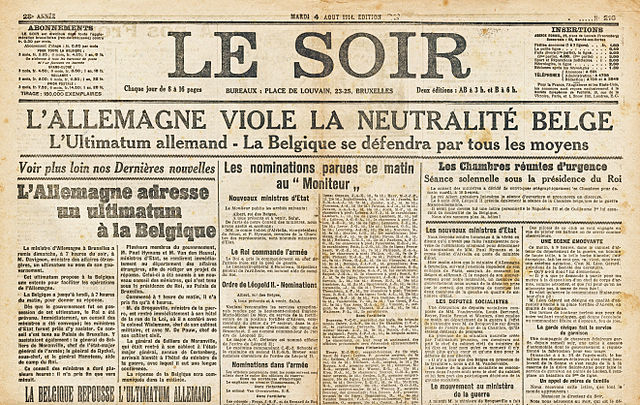Strategy Without Politics Is No Strategy: A Lesson of World War I for the Trump Era
The lessons of World War I are many and varied for those who study warfare. To name a few: Economic interconnectedness does not avert armed conflict; democratic states are capable of making durable and costly commitments to both war effort and alliances; the decisiveness of battlefield outcome is a central determinant of the sustainability of peace settlements; technological innovation can radically alter the offense-defense balance in military operations; and “laws of war” can be developed that create enduring norms limiting classes of weaponry.

Published by The Lawfare Institute
in Cooperation With

The lessons of World War I are many and varied for those who study warfare. To name a few: Economic interconnectedness does not avert armed conflict; democratic states are capable of making durable and costly commitments to both war effort and alliances; the decisiveness of battlefield outcome is a central determinant of the sustainability of peace settlements; technological innovation can radically alter the offense-defense balance in military operations; and “laws of war” can be developed that create enduring norms limiting classes of weaponry.
On this 100th anniversary of the war’s armistice, as we grieve the loss of 19 million lives and the shattering of fin de ciecle European societies, another
Alfred von Schlieffen’s plan for overcoming turn-of-the-century Germany’s insufficient forces to fight a two-front war was one of history’s most elegant solutions to a demanding problem: The German army would pass through the Low Countries to preemptively defeat the French army in the west and then swing back east to face a slow-mobilizing Russian army. But Schlieffen's strategy was disastrous as well, because it minimized the importance of violating Belgium’s sovereignty, something diplomats and politicians would have understood would trigger British involvement. The mind-set that strategy is separate from politics also allowed Germany’s military to rationalize its defeat on the battlefield as a “stab in the back” by politicians’ lack of support, which shaped how the German military and society viewed the rise of fascism. This delegitimized the political class and kept the military from exercising institutional restraints as Weimar collapsed.
The divorce of strategy from politics emerged after the Napoleonic wars, when great military thinkers such as Helmuth von Moltke attempted to professionalize military strategy by segregating warfighting from the pernicious influence of political leaders. But as Sir Lawrence Freedman demonstrates in his magisterial “Strategy: A History,” strategy divorced from politics leads either to irrelevance, because the strategy will not be employed, or disaster, when political leaders are confronted with the unexpected costs and consequences. The failure of von Schlieffen’s strategy is a vivid illustration of the latter danger.
It is the job of elected political leaders to determine which wars to fight and what proportion of national effort to commit to the undertaking. Political leaders aggregate societal preferences, and there is simply no substitute for political judgments to guide strategy—no matter how much such a substitute is yearned for or what superior outcomes excluding that political judgment might provide. No American political leaders have ever committed 100 percent of the country’s national effort to a war: Franklin Roosevelt didn’t in World War II, Abraham Lincoln didn’t in the Civil War and the Continental Congress didn’t in the revolution. After 17 years of war in Afghanistan, the United States still has no “civilian surge” as an integral counterpart for our military effort. The most important choices of war are its political choices; narrowing the aperture of strategy to just military planning is a recipe for failure.
Yet strategists have a tendency to want to leach the politics out of the making of strategy — especially American defense strategists, who are indoctrinated by the country’s civil-military culture into apolitical patterns of thought. Civilian leaders within the Defense Department understand how critical it is that national defense remain a bipartisan cause, and the U.S. military understands that its societal standing relies fundamentally on it remaining subordinate to political leaders and outside political disputes. Thus do strategists propose technical solutions like “a Goldwater Nichols for the interagency” to streamline the cacophony of policymaking in a government created expressly to prevent consolidation of power, even though streamlining policy in the way the 1985 defense reform legislation did internal to the Defense Department would reduce the ability of Congress, think tanks, journalists and departments from influencing policy outcomes. The problem with this approach is that ignoring political forces does not make them irrelevant; it just produces solutions that are impractical.
Both military and academic strategists eschew domestic politics because they’re messy, hard to model, and cloud the view of concrete elements that can be controlled and on which the fate of many conflicts rely, such as logistics. But there is no substitute for having a strategy married to its times, to use Defense Secretary Jim Mattis’s term for the proper embedding of politics into strategy.
The crafters of President Trump’s National Security Strategy heroically attempted to do just this, harnessing the president’s campaign agenda in developing the 2017 strategy. And, to their credit, it is a reasonable enough strategy—far better than we had any right to expect, given the president’s erratic and often unsound predilections. But their effort may now be judged a failure on the grounds of both irrelevance and potential disaster. Irrelevance, because Trump’s policies do not bear much resemblance to the confines of the National Security Strategy on any number of issues—Russia, American relationships with allies, or the importance of providing the resources necessary to achieve the strategy’s objectives in the first place. And potential disaster because the president is conveying deep unhappiness with the costs and consequences of those policies consistent with the strategy, such as the Afghanistan war and stabilizing involvement in Syria and Iraq, and he has even called into question whether he will sustain those policies at all. He may yet balk and abruptly change course.
World War I teaches that strategy and politics must go hand in hand, but the president’s mercurial leadership has made it impossible for that lesson to be put into effect. For all intents and purposes, the Trump administration does not have a strategy. Try as they might, the architects of it could not contain this president’s protean political force.




